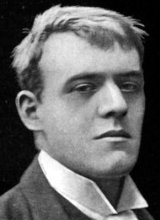The Death and Last Confession of Wandering Peter
Hilaire Belloc 1870 (La Celle-Saint-Cloud) – 1953
When Peter Wanderwide was young
He wandered everywhere he would:
All that he approved was sung,
And most of what he saw was good.
When Peter Wanderwide was thrown
By Death himself beyond Auxerre,
He chanted in heroic tone
To priests and people gathered there:
"If all that I have loved and seen
Be with me on the Judgment Day,
I shall be saved the crowd between
From Satan and his foul array.
"Almighty God will surely cry,
'St. Michael! Who is this that stands
With Ireland in his dubious eye,
And Perigord between his hands,
"'And on his arm the stirrup-thongs,
And in his gait the narrow seas,
And in his mouth Burgundian songs,
But in his heart the Pyrenees?'
"St. Michael then will answer right
(And not without angelic shame),
'I seem to know his face by sight:
I cannot recollect his name . . . . ?'
"St. Peter will befriend me then,
Because my name is Peter too:
'I know him for the best of men
That ever walloped barley brew.
"'And though I did not know him well
And though his soul were clogged with sin,
I hold the keys of Heaven and Hell.
Be welcome, noble Peterkin.'
"Then shall I spread my native wings
And tread secure the heavenly floor,
And tell the blessed doubtful things
Of Val d'Aran and Perigord."
_________
This was the last and solemn jest
Of weary Peter Wanderwide.
He spoke it with a failing zest,
And having spoken it, he died.
Font size:
Submitted on May 13, 2011
Modified on March 14, 2023
- 1:15 min read
- 49 Views
Quick analysis:
| Scheme | ABAB CDCD EXED DFXF FGXG HIHI JXJD KLKL MDMB NBNX |
|---|---|
| Closest metre | Iambic tetrameter |
| Characters | 1,322 |
| Words | 253 |
| Stanzas | 10 |
| Stanza Lengths | 4, 4, 4, 4, 4, 4, 4, 4, 4, 4 |
Translation
Find a translation for this poem in other languages:
Select another language:
- - Select -
- 简体中文 (Chinese - Simplified)
- 繁體中文 (Chinese - Traditional)
- Español (Spanish)
- Esperanto (Esperanto)
- 日本語 (Japanese)
- Português (Portuguese)
- Deutsch (German)
- العربية (Arabic)
- Français (French)
- Русский (Russian)
- ಕನ್ನಡ (Kannada)
- 한국어 (Korean)
- עברית (Hebrew)
- Gaeilge (Irish)
- Українська (Ukrainian)
- اردو (Urdu)
- Magyar (Hungarian)
- मानक हिन्दी (Hindi)
- Indonesia (Indonesian)
- Italiano (Italian)
- தமிழ் (Tamil)
- Türkçe (Turkish)
- తెలుగు (Telugu)
- ภาษาไทย (Thai)
- Tiếng Việt (Vietnamese)
- Čeština (Czech)
- Polski (Polish)
- Bahasa Indonesia (Indonesian)
- Românește (Romanian)
- Nederlands (Dutch)
- Ελληνικά (Greek)
- Latinum (Latin)
- Svenska (Swedish)
- Dansk (Danish)
- Suomi (Finnish)
- فارسی (Persian)
- ייִדיש (Yiddish)
- հայերեն (Armenian)
- Norsk (Norwegian)
- English (English)
Citation
Use the citation below to add this poem to your bibliography:
Style:MLAChicagoAPA
"The Death and Last Confession of Wandering Peter" Poetry.com. STANDS4 LLC, 2024. Web. 24 Apr. 2024. <https://www.poetry.com/poem/19224/the-death-and-last-confession-of-wandering-peter>.



Discuss the poem The Death and Last Confession of Wandering Peter with the community...
Report Comment
We're doing our best to make sure our content is useful, accurate and safe.
If by any chance you spot an inappropriate comment while navigating through our website please use this form to let us know, and we'll take care of it shortly.
Attachment
You need to be logged in to favorite.
Log In